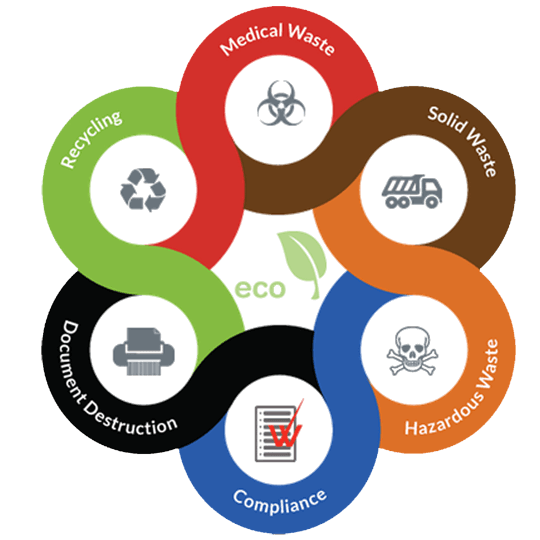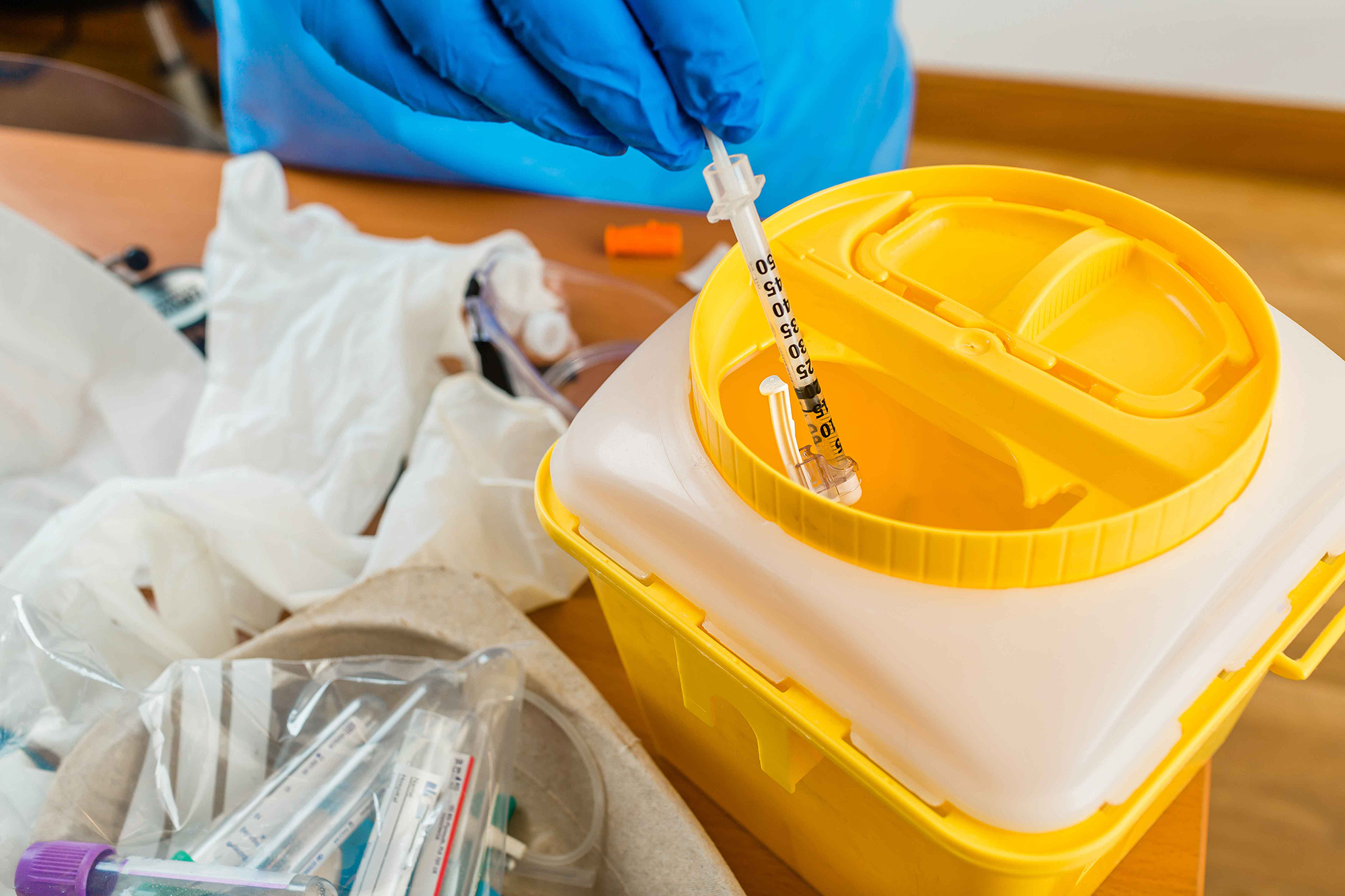Correct Disposal Strategies for Medical Waste
Appropriate disposal strategies for medical waste are of utmost value in ensuring the safety and security of both healthcare workers and the basic public. The suitable handling and disposal of medical waste is important to avoid the spread of infectious diseases and the contamination of the setting. This includes the risk-free disposal of sharps, infectious waste, and pharmaceutical waste. Following rigorous standards established by regulatory bodies is necessary to preserve compliance with lawful policies and secure public health. This introduction will certainly explore the relevance of correct medical garbage disposal, provide standards for handling various kinds of waste, and emphasize the demand for medical care centers to take on ideal methods. By following these guidelines, doctor can add to a much safer and much healthier atmosphere for all.
Significance of Proper Clinical Waste Disposal
Appropriate clinical waste disposal is of utmost significance in order to avoid the spread of infections and protect public health and wellness. Clinical waste describes any waste generated during clinical procedures or from the health care industry. This waste can consist of transmittable products, such as blood or physical liquids, sharps, drugs, and other possibly dangerous materials. Otherwise gotten rid of properly, clinical waste can present major dangers to health care employees, clients, and the basic public.
One of the main factors for proper clinical waste disposal is to protect against the spread of infections. Clinical waste can nurture various virus, including germs, viruses, and various other microorganisms that can create conditions. Improper disposal can result in the contamination of surface areas, water sources, and air, boosting the danger of infections. By securely taking care of clinical waste, the possibilities of direct exposure to these microorganisms are dramatically reduced, making sure the safety of health care workers, individuals, and the neighborhood at huge.
Additionally, appropriate medical garbage disposal is vital for securing public health. Clinical waste that is not appropriately taken care of can pollute soil, water bodies, and also food resources. This can result in the transmission of diseases to human beings and animals, posturing a significant public health and wellness risk (WasteX Medical Waste Disposal). By complying with correct disposal techniques, such as partition, treatment, and control, we can lessen the prospective threats associated with clinical waste and safeguard the well-being of the community.
Handling and Disposing of Sharps
When it concerns the handling and disposal of sharps, adherence to appropriate procedures is necessary for ensuring the security of healthcare employees and stopping the risk of injury or infection. Sharps include needles, syringes, lancets, and other products with the prospective to puncture or reduce the skin. Because of their potential to transfer bloodborne pathogens, such as HIV and liver disease B and C, it is important to handle and get rid of of sharps appropriately.

Disposal of sharps containers must adhere to regional guidelines and guidelines. It is best to make use of qualified medical waste disposal services that specialize in the proper handling and disposal of sharps to ensure conformity with guidelines and reduce threats to healthcare employees and the setting.
Guidelines for Transmittable Waste Disposal
Healthcare facilities must follow stringent guidelines for the disposal of transmittable waste to stop the spread of pathogens and protect public health and wellness. Transmittable waste, additionally referred to as biohazardous or biomedical waste, refers to products that are potentially infected with infectious representatives or various other dangerous materials. These products consist of blood-soaked bandages, used gloves, samplings, and societies. Proper disposal of transmittable waste is important to make certain the safety and wellness of medical care workers, patients, and the general public.
The standards for transmittable garbage disposal vary depending upon the country and regional laws, yet there are some common methods that medical care facilities ought to comply with. All contagious waste needs to be set apart from various other types of waste at the factor of generation. This aids prevent cross-contamination and makes sure that the waste can be handled suitably. Second of all, transmittable waste must be kept in leak-proof, puncture-resistant containers that are plainly labeled with the biohazard sign. When not in usage to lessen the threat of direct exposure, these containers need to be maintained shut. Contagious waste must be moved and disposed of by licensed waste monitoring companies that specialize in dealing with biomedical waste.
It is very important for medical care centers to have detailed training programs in position to educate team on the proper procedures for transmittable garbage disposal. This consists of training on waste partition, storage space, and taking care of strategies. By following these standards, health care centers can effectively manage contagious waste, lower the threat of infections, and safeguard public wellness.
Ideal Practices for Drug Garbage Disposal
Drug garbage disposal should always be performed frequently and based on expert standards. Proper administration of pharmaceutical waste is vital to shield public health and wellness and the environment. Drugs can posture a significant risk if not thrown away correctly, as they may contaminate water sources, injury water life, or perhaps add to the growth of antibiotic resistance.
Among the most effective practices for pharmaceutical garbage disposal is to develop a marked collection system within healthcare facilities. medical waste disposal service. This system should include separate containers for different kinds of pharmaceutical waste, such as run out medicines, unused drugs, and infected materials. These containers should be clearly classified and located in quickly available areas to urge correct disposal by health care professionals
Furthermore, it is important to educate healthcare team about the correct handling and disposal of pharmaceutical waste. Training programs ought to concentrate on identifying various sorts of pharmaceutical waste, comprehending the linked threats, and following the suitable disposal treatments. Regular tips and updates ought to be given to make sure compliance with disposal guidelines.
In enhancement to internal techniques, healthcare centers should likewise establish partnerships with accredited waste monitoring firms. These companies concentrate on the collection, transport, and disposal of pharmaceutical waste. By collaborating with these specialists, medical care facilities can guarantee that their pharmaceutical waste is taken care of securely and in compliance with neighborhood policies.
Compliance With Legal Regulations
In order to ensure compliance with legal laws, it is vital for medical care facilities to stick to correct disposal methods for clinical waste. Medical waste poses a substantial threat to public wellness and the environment, making it important for medical care facilities to handle and dispose of it in conformity with the law.
Regulatory bodies, such as the Occupational Safety and Health And Wellness Administration (OSHA) and the Epa (EPA), have actually established standards and needs for the appropriate disposal of medical waste - WasteX Medical Waste Disposal. These regulations aim to secure health care workers, waste management personnel, and the basic public from potential dangers connected with medical waste

Non-compliance with lawful regulations can cause severe repercussions for healthcare facilities, consisting of penalties, lawful responsibilities, damage to credibility, and prospective harm to public health and wellness. As a result, it is essential for medical care facilities to remain up-to-date with the most current guidelines and continuously monitor and enhance their waste administration methods.
Final Thought
Finally, appropriate disposal strategies for medical waste are important to make certain the safety of health care workers, individuals, and the atmosphere. Abiding by standards for getting rid of and taking care of of sharps, contagious waste, and pharmaceutical waste is essential. Compliance with legal policies is necessary to stop the spread of infections and secure public health. It is critical that healthcare centers maintain strict methods for the appropriate disposal of clinical waste to minimize threats and keep a risk-free health care environment.
Clinical waste refers to any type of waste generated throughout clinical procedures or from the healthcare industry. Infectious waste, likewise recognized as biohazardous or biomedical waste, refers to products that are possibly click this infected with infectious agents or various other unsafe compounds. All contagious waste ought to be set apart from other types of waste at the point of generation. Infectious waste needs to be transported and disposed of by qualified waste administration firms that specialize in handling biomedical waste.
Adhering to standards for disposing and managing of sharps, transmittable waste, and pharmaceutical waste is vital. (medical waste disposal)